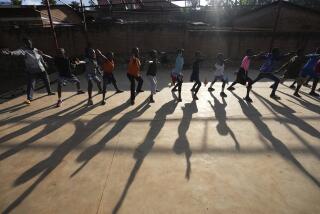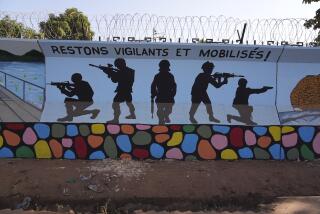In Ghana’s witch camps, the accused are never safe
JOHANNESBURG, South Africa — In the witch camps of Ghana, the dying contortions of a slaughtered chicken determine the guilt of an accused woman: witch, or not.
If the chicken falls with its head down and its feet in the air, the woman is declared a witch and she must spend the rest of her days in the squalor of the camp, abandoned by her family, with just one unfortunate young relation sent by her family to care for her until she dies.
And if the chicken collapses feet down and she’s declared innocent of witchcraft? She still must spend her remaining years in the camp, just in case some villagers don’t believe in her innocence.
“They’re not safe when they return,” said Adwoa Kwateng-Kluvitse, Ghana director for international aid organization Action Aid, which is working to educate northern Ghanaian communities on the rights of the accused in an effort to end witchcraft accusations.
“Even if the ritual says she’s innocent, there will be members of the community who will feel unsafe.”
Northern Ghana has six witch camps that have been in existence for more than 100 years, accommodating 800 accused witches — almost all of them women — and 500 relatives sent by families to take care of them.
Last year, the Ghanaian government announced that the witch camps must be closed in 2012. But that will be no easy task because of the stigma attached to the women.
The camps are places of shame, from which there is almost never an escape. Elderly women, often widows, are accused when something goes wrong: a drowned child, an outbreak of malaria, a drought, a spate of cattle deaths, or something as simple as a cow trying to jump a fence and knocking it down. Some are accused merely because someone dreamed about them.
After the chicken slaughter ritual, they’re often forced to drink a cleansing potion consisting of chicken blood and dirt.
“The witch camps are effectively women’s prisons where inmates have been given no trial, have no right of appeal but have received a life sentence,” said a recent report by Action Aid.
“The typical story is that there will be allegations and emotions rise,” Kwateng-Kluvitse said in a phone interview. “In some cases, the woman hears about it and flees. But often they’re caught and brutalized. Usually it’s the young men in the community who brutalize them, shoving them, pushing them, beating them. Some of them are killed.”
In 2010, a 78-year-old woman was accused of witchcraft in the town of Tema and set afire by three women and two men, including a pastor, in a case condemned by authorities.
Sano Kojo has been living in a camp for 30 years, since she was in her mid-30s and accused of killing her cousin by pressing on his chest.
“Once you are here, you are forgotten,” she said, according to the report.
Asana, 27, whose last name wasn’t supplied in the report, was pregnant when she was accused by her husband, who dreamed she wanted to kill him. She ended up in a witch camp called Gambaga.
“One day when I was five months pregnant, while I was in the fields with other women, he came after me and he beat me with no mercy. While I was on the ground he took out a knife. The other women were begging him to stop.
“He did not kill me at the end. I was taken to a shrine,” she said, referring to a place at the witch camp where accusations of witchcraft are tested. “There, he melted plastic and poured it on my body. When I came here my whole body was in terrible pain.”
Families typically send a young relation, usually a granddaughter or great-granddaughter age 10 to 14, to look after the accused, cook, collect firewood and water, and clean.
The girls also become tainted by the witch camps, drop out of school and can’t go back to their families even after the death of the relation they are sent to care for. Some of these once-young women have been in the camp for 40 years.
“It’s an abuse of the rights of the children in the camps. It affects their rights to education, to play and live with their families,” Kwateng-Kluvitse said.
Kwateng-Kluvitse said that although her organization supported the eventual closure of the camps, it was important to do so gradually, only after community attitudes were changed and women could live safely in communities without fear of being accused anew.
“Action Aid would not advocate just dismantling the camps overnight,” she said. “Where would women go; where they could be safe? It has to be a process.” She said it could take 10 or 20 years before the camps could be shut down for good because of the strong resistance in the accusing communities.
“It’s something that they have believed in for generations,” she said. “The idea of witchcraft had never been challenged, and there are some people with entrenched views.”
More to Read
Start your day right
Sign up for Essential California for news, features and recommendations from the L.A. Times and beyond in your inbox six days a week.
You may occasionally receive promotional content from the Los Angeles Times.






